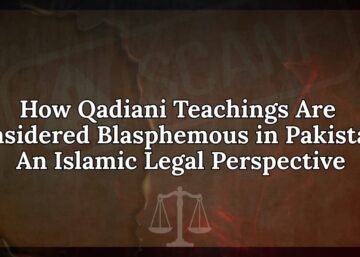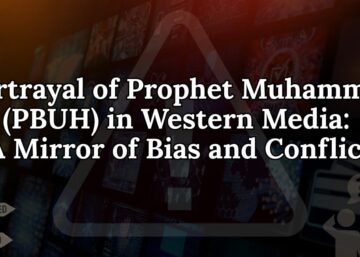The Ahmadiyya movement, also known as Qadianism, emerged in late 19th-century British India under the leadership of Mirza Ghulam Ahmad Qadiani. Claiming to be the Promised Messiah and Mahdi, Mirza Qadiani’s teachings diverged significantly from established Islamic beliefs, particularly in areas such as the Finality of Prophethood, jihad, and social interaction with Muslims. These doctrinal deviations led to widespread theological controversy and culminated in the legal and constitutional classification of the movement as non-Muslim in several Muslim-majority countries, notably Pakistan.
The Concept of Finality of Prophethood
Mainstream Islamic Belief
One of the core tenets of Islam is the Finality of Prophethood. Muslims universally believe that the Prophet Muhammad (PBUH) is the Last and Final Messenger of God. The Quran explicitly affirms this in Surah al-Ahzab:
“Muhammad is not the father of any of your men, but (he is) the Messenger of Allah and the Seal of the Prophets.”
(Quran 33:40)
Numerous Hadiths support this doctrine, and it is considered a fundamental belief; denying it is regarded as disbelief (kufr) by consensus of Islamic scholars across all major schools of thought (ijma al-ummah) [Al-Bukhari; Muslim; al-Tahawi, al-Aqidah al-Tahawiyyah].
Qadianis Position
Qadianis believe that Mirza Ghulam Ahmad was a “zilli” (shadow) and “buruzi” (manifestation) prophet subordinate to Prophet Muhammad (PBUH). [Review of Religions, Ahmadiyya Publication]. Although Ahmadis claim this does not contradict the Finality of Prophethood since no new law was revealed, the belief in any form of Prophethood after Prophet Muhammad (PBUH) is categorically rejected by mainstream scholars. This interpretation was formally rejected by the Muslim world, leading Pakistan’s National Assembly in 1974 to declare Ahmadis a non-Muslim minority through constitutional amendment (Article 260(3)(b), Constitution of Pakistan).
Jihad: Armed and Spiritual Dimensions
Islamic Viewpoint
In Islam, jihad encompasses a broad struggle that includes personal reform, propagation of truth, and, under strict conditions, armed resistance. The Quran identifies various forms: jihad bil-nafs (struggle against the self), jihad bil-mal (financial sacrifice), and jihad bis-saif (armed struggle in defense). However, armed jihad is only permissible under specific conditions, such as defense against aggression and under legitimate Islamic governance (Quran 22:39-40; 2:190).
Ahmadiyya Interpretation
Mirza Ghulam Ahmad Qadiani declared that physical jihad was no longer applicable in the modern era, labelling it outdated. This position was especially significant during British colonial rule in India, when Muslims were engaged in anti-colonial struggles. Critics argue this stance aligned the movement politically with British interests and undermined Muslim resistance efforts.
Social Relations with Muslims
Islamic Teaching
Islam promotes unity among its adherents. The Quran commands Muslims to avoid sectarianism (Quran 3:103) and to engage in collective rituals such as prayer, funeral rites, and marriage. Classical jurists, including Imam Abu Hanifa, Shafi’i, Malik, and Ahmad bin Hanbal, emphasized the importance of Muslim social solidarity.
Ahmadiyya Practice
Ahmadis are doctrinally restricted from participating in religious or social life with non-Ahmadi Muslims. They often avoid intermarriage, communal prayer, or funeral participation with mainstream Muslims unless permitted by their leadership. Critics argue this approach fosters sectarianism and separates them from the broader Muslim Ummah.
Reverence of Sacred Places
Mainstream Muslim Belief
Mecca and Medina are the holiest cities in Islam, housing the Kaaba and the Prophet’s Mosque. Pilgrimage to these cities (Hajj and Umrah) is a pillar of Islamic practice.
The Status of Qadian
Certain Ahmadi leaders and writings have ascribed exaggerated spiritual status to Qadian, the birthplace of their founder. Annual gatherings in Qadian are seen as spiritual equivalents to Hajj by some adherents, drawing criticism from mainstream Muslims who consider this an affront to the sanctity of Mecca and Medina.
Interpretation of Qur’an and Hadith
Orthodox Islam
Muslims believe the Quran is the final, unaltered revelation of God, with the Sunnah and Hadith as its explanatory framework. Revelation ceased with the Prophet Muhammad (PBUH). No scripture after the Quran is recognized.
Ahmadiyya Position
Ahmadis place considerable theological weight on the writings of Mirza Ghulam Ahmad, often interpreting scripture through his lens. Some critics claim Ahmadis equate Ahmad’s revelations with divine inspiration, challenging the doctrine of the closure of revelation.
Legal and Constitutional Status in Pakistan
In 1974, Pakistan’s National Assembly unanimously passed the Second Amendment to the Constitution, declaring Ahmadis non-Muslims for law. Subsequently, Ordinance XX (1984) under General Zia-ul-Haq prohibited Ahmadis from referring to themselves as Muslims or practicing Islamic rituals in public, including the use of Islamic greetings, terms like “Assalamoaliakom”, “Masjid,” or reciting the Quran publicly [See: Constitution of Pakistan, Article 260(3)(b); Pakistan Penal Code, Sections 298-B and 295-C].
International Perceptions
Human Rights Organizations
Groups like Amnesty International and Human Rights Watch have criticized Pakistan’s laws concerning Ahmadis, calling them violations of religious freedom. They argue that faith-based identity should not invite criminal penalties [Amnesty International Reports on Pakistan, 2017–2023].
Muslim World Response
Many Muslim-majority countries, including Saudi Arabia, Indonesia, and Malaysia, have also declared Qadiani beliefs outside the fold of Islam. They cite doctrinal deviations, particularly concerning the Finality of Prophethood, as grounds for this position.
Conclusion: A Separate Religious Identity
The differences between Ahmadiyya beliefs and mainstream Islamic doctrine are not marginal but foundational. The denial of the Finality of Prophethood, reinterpretation of jihad, the distinct social practices, and elevation of a new prophet all represent core theological deviations. Consequently, the Qadiani movement is not recognized as a sect of Islam but as a distinct religion by the overwhelming consensus of Muslim scholars and communities.
While individual rights and safety must be protected, theological clarity and religious integrity are equally vital. Muslims are encouraged to uphold Islamic principles with wisdom, knowledge, and ethical conduct, engaging in intellectual dialogue without resorting to hatred or violence.



